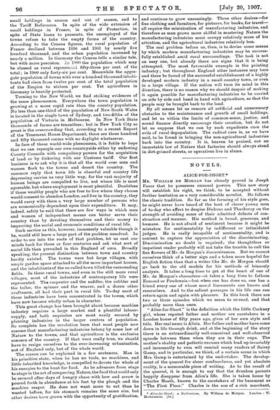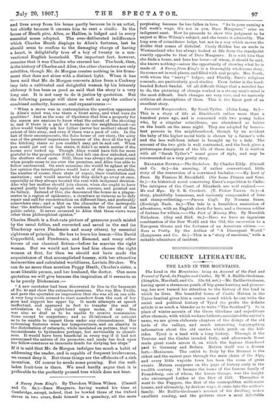NOVELS.
ALICE-FOR-SHORT.* Mn. WILLIAM DE MORGAN has already proved in Joseph Vance that he possesses unusual powers. This new story will establish his right, we think, to be accepted without further hesitation as a very considerable novelist. He follovis the classic tradition. So far as the forming of his style goes, he might never have heard of the host of clever young men of to-day who affect to despise Dickens and Thackeray on the strength of avoiding some of their admitted defects of con- struction and manner. His method is broad, generous, and humane. He is not afraid of sentiment because it might be mistaken for sentimentality by indifferent or intimidated judges. He is really incapable of sentimentality, and is content to capture the appreciation of the discriminating. Discrimination no doubt is required; the thoughtless or impatient reader probably will not take the trouble to cull the fine flowers of Mr. de Morgan's discursiveness. But we cannot ourselves think of a better sign and a token more hopeful for English fiction than that a writer like Mr. de Morgan should go back to the old models for his methods of leisurely analysis. It takes a long time to get at the heart of one of Mr. de Morgan's characters—it takes a long time to fathom Esmond or Peudennis—but when one has done so, one has a friend every one of whose moral lineaments one knows and remembers. And to the salient passages in his life one can return again and again with pleasure. In this book there are two or three episodes which we mean to re-read, and that probably more than once.
"Alice-for-Short" is the definition which the little Cockney girl, whose reputed father and mother are caretakers in a London house of fifty years ago, gives of her own style and title. Her real name is Alicia. Her father and mother have come down in life through drink, and at the beginning of the story there is an extraordinarily well-conceived and well-observed episode between them when they are in their cups. The mother's shabby and pathetic excuses which lead up invariably and incessantly to rum will remind many readers of Sairey Gamp, and in particular, we think, of a certain scene in which Mrs. Gamp is entertained by the undertaker. The develop- ment of the quarrel for sheer confusedness, and yet absolute reality, is a memorable piece of writing. As to the result of the quarrel, it is enough to say that the drunken parents happily disappear from Alice's life. She is taken home by Charles Heath, known to the caretakers of the basement as "The First Floor." Charles is the son of a rich merchant,
• Alice-for-Short a llichronism. By William de Morgan. Lonaon :W. Heinemann. [es.] and lives away from his borne partly because he is an artist, but chiefly because it 'amuses him to rent a studio. In the house of Heath pere, Alice, or Hallice, is lodged and in every essential sense adopted. The over-deliberated indifference which Charles Heath displays to Alice's fortunes, lest he should seem to confess to the damaging charge of having a heart, is delightfully true of a boy of twenty in a con- ventional English household. The important fact, however, remains that it was Charles who rescued her. The book, then, is the history of Charles and Alice; the other characters are only satellites, though Mr. de Morgan creates nothing in his firma- ment that does not shine with a distinct light. When it has been said that Mr. de Morgan converts Alice from a Cockney' imp into a cultivated and delightful woman by his leisurely alchemy it has been as good as said that the story is a very long one. It is not easy to do it justice by quotation. But the following passage will show as well as any the author's combined audacity, humour, and expansiveness When a move was in contemplation the question uppermost in Alice's mind was, was there a front airey, and what were its qualities ? Just as the sons of Opulence that hire a property for the season are anxious to know what the extent of the shooting is, and if there is a pack of hounds in the neighbourhood—so Alice would timidly ask her father (never her mother) about the extent of this airey, and even if there was a pack of cats. In the last of their encampments, the Soho house of our story, the airey was of the greatest importance because of the door at the top of the kitching stairs so you couldn't easy get in and out. When you could get out on the stairs, it didn't so much matter if the rooms were locked up. Though Alice would have felt far more grateful to the proprietors if they had left one door unlocked, and the shutters stood open. Still, there was always the great event when people came to see over the premises, and Alice was able to follow unobserved. On such occasions she would be aghast at the low opinion the investigators would have of the space available, the number of rooms, their state of repair, their ventilation and sanitation ; and would marvel why they didn't go away at once, especially as they always treated the rent with indignant derision. Also why her mother should join chorus, when she ought to have argued gently but firmly against each censure, and pointed out its fallacy. Instead of this, she denounced the house as a plague- centre in a region of epidemics ; a structure so ruinous as to defy repair and call for reconstruction on different lines, and preferably somewhere else ; and a blot on the character of the metropolis that the Authorities' ought to condemn in the interest of the public safety. It never occurred to Alice that these views were other than philosophical opinion."
Charles Heath is a first-rate picture of generous youth misled by the usual follies, and corrected and saved in the end (as Thackeray saves Pendennis and many others) by essential rightness of principle. He has to learn his lesson—like David Copperfield, and Pendennis, and Esmond, and many other heroes of our classical fiction—before he marries the right woman. But we would not have had him choose the right woman at first, for then we should not have made the acquaintance of that accomplished hussey, with her attractive insincerities and calculated worldliness, Lavinia Straker. We can do no more than mention Peggy Heath, Charles's sister, a most likeable person, and her husband, the doctor. One more quotation we will give because the inspiration of it seems to us to be purely Dickensian :—
"A new caretaker had been discovered to live in the basement of No. 40 and show the extensive premises. She was Mrs. Twills, and gave the spectator an impression that she was all on one side. A very long tooth seemed to start somehow from the root of her nose and support her upper lip. It made attempts at speech ineffectual, and appeared in fact to transfer the seat of articulation to the right-hand upper molar, if any. She was also so deaf as to be unable to receive communica- tions except by conjecture ; and so ill-informed or reticent as to be unable to impart them under any circumstances. Her redeeming features were her temporariness, and an alacrity in the distribution of cataracts, while insulated on pattens, that was inconsiderate to bystanders perhaps, but serviceable to cleanli- ness. It would have been beneficial in every way if it had not envenomed the nature of its promoter, and made her look upon her fellow-creatures as incarnate fiends for dirtying her steps."
If it is said that Mr. de Morgan indulges too much a habit of addressing the reader, and is capable of frequent irrelevances, we cannot deny it. But these things are the offshoots of a rich invention. Of course be needs some pruning. But the well- laden fruit-tree is there. We need hardly argue that it is preferable to the perfectly pruned tree which does not bear.







































 Previous page
Previous page